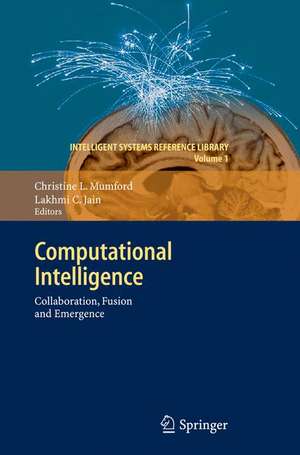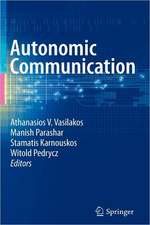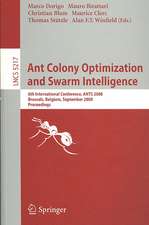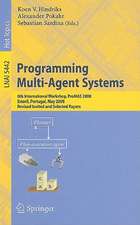Computational Intelligence: Collaboration, Fusion and Emergence: Intelligent Systems Reference Library, cartea 1
Editat de Christine L. Mumforden Limba Engleză Hardback – 21 iul 2009
| Toate formatele și edițiile | Preț | Express |
|---|---|---|
| Paperback (1) | 1920.04 lei 6-8 săpt. | |
| Springer Berlin, Heidelberg – 29 noi 2011 | 1920.04 lei 6-8 săpt. | |
| Hardback (1) | 1926.94 lei 6-8 săpt. | |
| Springer Berlin, Heidelberg – 21 iul 2009 | 1926.94 lei 6-8 săpt. |
Din seria Intelligent Systems Reference Library
- 20%
 Preț: 1050.57 lei
Preț: 1050.57 lei - 20%
 Preț: 1157.60 lei
Preț: 1157.60 lei - 20%
 Preț: 648.44 lei
Preț: 648.44 lei - 20%
 Preț: 650.08 lei
Preț: 650.08 lei - 20%
 Preț: 1005.64 lei
Preț: 1005.64 lei - 5%
 Preț: 968.88 lei
Preț: 968.88 lei - 20%
 Preț: 1052.67 lei
Preț: 1052.67 lei - 20%
 Preț: 1171.46 lei
Preț: 1171.46 lei - 20%
 Preț: 1164.84 lei
Preț: 1164.84 lei - 20%
 Preț: 815.83 lei
Preț: 815.83 lei - 20%
 Preț: 989.96 lei
Preț: 989.96 lei - 20%
 Preț: 1063.41 lei
Preț: 1063.41 lei - 20%
 Preț: 925.45 lei
Preț: 925.45 lei - 20%
 Preț: 504.37 lei
Preț: 504.37 lei - 18%
 Preț: 1113.26 lei
Preț: 1113.26 lei - 20%
 Preț: 1920.04 lei
Preț: 1920.04 lei - 20%
 Preț: 990.62 lei
Preț: 990.62 lei - 20%
 Preț: 651.57 lei
Preț: 651.57 lei - 20%
 Preț: 645.97 lei
Preț: 645.97 lei - 20%
 Preț: 660.16 lei
Preț: 660.16 lei - 20%
 Preț: 647.13 lei
Preț: 647.13 lei - 20%
 Preț: 654.05 lei
Preț: 654.05 lei - 20%
 Preț: 649.93 lei
Preț: 649.93 lei - 20%
 Preț: 648.11 lei
Preț: 648.11 lei - 20%
 Preț: 657.99 lei
Preț: 657.99 lei - 20%
 Preț: 656.84 lei
Preț: 656.84 lei - 20%
 Preț: 1624.04 lei
Preț: 1624.04 lei - 20%
 Preț: 642.98 lei
Preț: 642.98 lei - 20%
 Preț: 649.60 lei
Preț: 649.60 lei - 20%
 Preț: 651.23 lei
Preț: 651.23 lei - 20%
 Preț: 653.06 lei
Preț: 653.06 lei - 20%
 Preț: 1002.99 lei
Preț: 1002.99 lei - 20%
 Preț: 645.14 lei
Preț: 645.14 lei - 20%
 Preț: 658.33 lei
Preț: 658.33 lei - 20%
 Preț: 644.98 lei
Preț: 644.98 lei - 20%
 Preț: 646.62 lei
Preț: 646.62 lei
Preț: 1926.94 lei
Preț vechi: 2408.68 lei
-20% Nou
Puncte Express: 2890
Preț estimativ în valută:
368.71€ • 386.00$ • 305.09£
368.71€ • 386.00$ • 305.09£
Carte tipărită la comandă
Livrare economică 05-19 aprilie
Preluare comenzi: 021 569.72.76
Specificații
ISBN-13: 9783642017988
ISBN-10: 3642017983
Pagini: 752
Ilustrații: XV, 732 p.
Dimensiuni: 155 x 235 x 51 mm
Greutate: 1.22 kg
Ediția:2009
Editura: Springer Berlin, Heidelberg
Colecția Springer
Seria Intelligent Systems Reference Library
Locul publicării:Berlin, Heidelberg, Germany
ISBN-10: 3642017983
Pagini: 752
Ilustrații: XV, 732 p.
Dimensiuni: 155 x 235 x 51 mm
Greutate: 1.22 kg
Ediția:2009
Editura: Springer Berlin, Heidelberg
Colecția Springer
Seria Intelligent Systems Reference Library
Locul publicării:Berlin, Heidelberg, Germany
Public țintă
ResearchCuprins
Synergy in Computational Intelligence.- Computational Intelligence: The Legacy of Alan Turing and John von Neumann.- Fusing Evolutionary Algorithms and Fuzzy Logic.- Multiobjective Evolutionary Algorithms for Electric Power Dispatch Problem.- Fuzzy Evolutionary Algorithms and Genetic Fuzzy Systems: A Positive Collaboration between Evolutionary Algorithms and Fuzzy Systems.- Multiobjective Genetic Fuzzy Systems.- Adaptive Solution Schemes.- Exploring Hyper-heuristic Methodologies with Genetic Programming.- Adaptive Constraint Satisfaction: The Quickest First Principle.- Multi-agent Systems.- Collaborative Computational Intelligence in Economics.- IMMUNE: A Collaborating Environment for Complex System Design.- Bayesian Learning for Cooperation in Multi-Agent Systems.- Collaborative Agents for Complex Problems Solving.- Computer Vision.- Predicting Trait Impressions of Faces Using Classifier Ensembles.- The Analysis of Crowd Dynamics: From Observations to Modelling.- Communications for CI Systems.- Computational Intelligence for the Collaborative Identification of Distributed Systems.- Collaboration at the Basis of Sharing Focused Information: The Opportunistic Networks.- Artificial Immune Systems.- Exploiting Collaborations in the Immune System: The Future of Artificial Immune Systems.- Parallel Evolutionary Algorithms.- Evolutionary Computation: Centralized, Parallel or Collaborative.- CI for Clustering and Classification.- Fuzzy Clustering of Likelihood Curves for Finding Interesting Patterns in Expression Profiles.- A Hybrid Rule-Induction/Likelihood-Ratio Based Approach for Predicting Protein-Protein Interactions.- Improvements in Flock-Based Collaborative Clustering Algorithms.- Combining Statistics and Case-Based Reasoning for Medical Research.- Collaborative and Experience-Consistent Schemes of System Modelling in Computational Intelligence.
Textul de pe ultima copertă
This book is the first in a new series entitled "Intelligent Systems Reference Library". It is a collection of chapters written by leading experts, covering a rich and diverse variety of computer-based techniques, all involving some aspect of computational intelligence (CI). Authors in this collection recognize the limitations of individual paradigms, and propose some practical and novel ways in which different CI techniques can be combined with each other, or with more traditional computational techniques, to produce powerful problem-solving environments.
Common themes to be found in the various chapters of this collection include the following:
The book covers a wide range of cutting edge techniques and applications, and is divided into the following parts:
I. Introduction
II. Fusing evolutionary algorithms and fuzzy logic
III. Adaptive solution schemes
IV. Multi-agent systems
V. Computer vision
VI. Communication for CI systems
VII. Artificial immune systems
VIII. Parallel evolutionary algorithms
IX. CI for clustering and classification
Common themes to be found in the various chapters of this collection include the following:
- Fusion,
- Collaboration, and
- Emergence.
The book covers a wide range of cutting edge techniques and applications, and is divided into the following parts:
I. Introduction
II. Fusing evolutionary algorithms and fuzzy logic
III. Adaptive solution schemes
IV. Multi-agent systems
V. Computer vision
VI. Communication for CI systems
VII. Artificial immune systems
VIII. Parallel evolutionary algorithms
IX. CI for clustering and classification
Caracteristici
Latest research in the area of theory and applications of fusion of intelligent paradigms
















